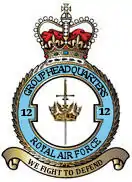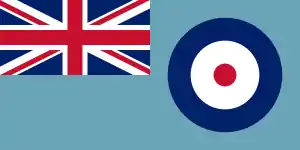No. 12 Group RAF
No. 12 Group of the Royal Air Force was a command organization that existed over two separate periods, namely the end of World War I when it had a training function and from just prior to World War II until the early 1960s when it was tasked with an air defence role.
| No. 12 Group RAF | |
|---|---|
 | |
| Active | 1918–1919 1937–1963 |
| Country | United Kingdom |
| Branch | Royal Air Force |
| Type | Group Headquarters |
| Role | Defence of the Midlands and East Anglia |
| Part of | RAF Fighter Command |
| Garrison/HQ | RAF Watnall, Nottinghamshire, England |
| Motto(s) | We fight to defend[1] |
| Royal Air Force Ensign |  |
History
No. 12 Group was first formed in April 1918 at Cranwell, Lincolnshire, within No. 3 Area. It succeeded the Royal Navy's Central Depot and Training Establishment which had been training naval aviators at Cranwell since 1916. The first RAF General Officer Commanding was Brigadier-General H D Briggs who received the appointment on promotion from Captain in the Royal Navy. On 8 May 1918 the group transferred to Midland Area, and then to Northern Area on 18 October 1919. On 1 November that year the Group ceased to exist when it became the RAF (Cadet) College.
The group was reformed on 1 April 1937 in Fighter Command. It was the group responsible for aerial defence of the Midlands, Norfolk, Lincolnshire and North Wales. Construction of a purpose built site at RAF Watnall, a non flying station, was not completed until late 1940, after which operations were relocated from nearby RAF Hucknall. During World War II this group was the second most important group of Fighter Command, and as such, it received its share of attacks from the German Luftwaffe throughout the war.
The commander of 12 Group during the Battle of Britain was Air Vice Marshal Trafford Leigh-Mallory, who was a rather ambitious man. Despite his length of service in the RAF, he was passed over for being named the Air Officer Commanding of the more vital 11 Group in favour of Air Vice Marshal Keith Park. Leigh-Mallory felt himself slighted over this and his relations with Park were poisoned thereafter.
As well as regional defence, 12 Group were also supposed to provide fighter cover for 11 Group airfields during the Battle of Britain, but several times, these fields were left undefended. When Park complained about it, Leigh-Mallory responded that in order to test his Big Wing theory (espoused by Squadron Leader Douglas Bader), more time was needed to get the necessary squadrons airborne.
The Big Wings met with mixed success, enough for the Air Ministry to use it as an excuse to oust Park and Air Chief Marshal Hugh Dowding from their commands on the grounds that they had mismanaged the Battle of Britain.
After Park was ousted, Leigh-Mallory took over 11 Group. 12 Group still continued its assignment of defending the Midlands and supporting both 10 Group and 11 Group.
Group Headquarters moved to RAF Newton in December 1946 and the operations block at Watnall was closed.[2] Group HQ then moved again on 14 August 1959 to RAF Horsham St Faith.[3]
It was renamed No. 12 (East Anglian) Sector on 31 March 1963. On 30 April 1968, as the new Strike Command came into existence, 12 Group passed into history.
Commanders
The following officers had command of No. 12 Group:
1918 to 1919
- 1 April 1918 Brigadier-General H D Briggs
- 1 May 1919 Brigadier-General F R Scarlett
1937 to 1963
- 1 April 1937 Air Vice-Marshal J H S Tyssen
- 4 December 1937 Air Vice-Marshal T L Leigh-Mallory
- 17 December 1940 Air Vice-Marshal R E Saul[4]
- 29 November 1942 Air Vice-Marshal J O Andrews
- 1 June 1943 Air Vice-Marshal R M Hill
- 22 November 1943 Air Vice-Marshal M Henderson
- 1 January 1945 Air Vice-Marshal J W Baker
- 5 May 1946 Air Vice-Marshal T C Traill[5]
- 17 November 1948 Air Vice-Marshal G Harcourt-Smith
- 1 June 1951 Air Vice-Marshal R L R Atcherley
- 13 November 1953 Air Vice-Marshal W J Crisham
- 25 June 1956 Air Vice-Marshal H P Fraser
- 1 August 1958 Air Commodore C H Hartley (Chief of Staff as acting AOC)
- 1 January 1959 Air Vice-Marshal J R A Embling
- 20 July 1959 Air Vice-Marshal C H Hartley
- 1 June 1961 Air Vice-Marshal R N Bateson
References
- Pine, L.G. (1983). A dictionary of mottoes (1 ed.). London: Routledge & Kegan Paul. p. 263. ISBN 0-7100-9339-X.
- "RAF Watnall : Fighter Command's 12 Group HQ". Subterranea Britannica. Retrieved 3 January 2021.
- Rafweb.org, Air of Authority: Groups 10-19, accessed January 2021.
- Air of Authority – A History of RAF Organisation – Air Vice-Marshal R E Saul
- Air of Authority – A History of RAF Organisation – Air Vice Marshal T C Traill
See also
- RAF Fighter Command
- Battle of Britain
- Battle of Britain Airfields
- Battle of Britain Squadrons